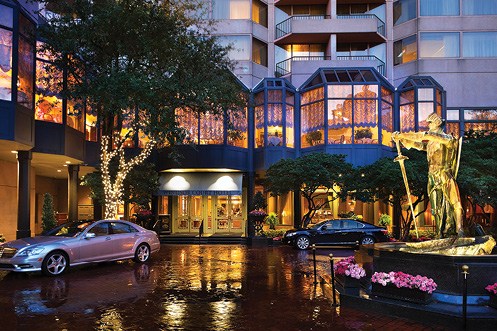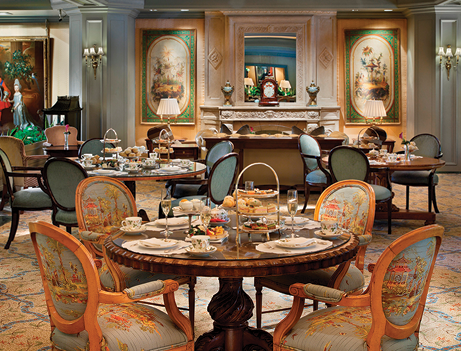- Home
- Media Kit
- Current Issue
- Past Issues
- Ad Specs-Submission
- Ad Print Settings
- Reprints (PDF)
- Photo Specifications (PDF)
- Contact Us

![]()
ONLINE

The Heart of Hospitality
Editors’ Note
David Teich has held his current position since August 2008. Prior to this, he was Food and Beverage Director at Charleston Place Hotel, and before that, Director of Catering and Conference Services at Hyatt Regency Coral Gables.
Property Brief
The 23-story Windsor Court Hotel (windsorcourthotel.com) is located in the heart of the Central Business District of New Orleans, steps from the French Quarter, and features 316 spacious guest rooms and suites, the acclaimed Grill Room Restaurant, the storied Polo Club Lounge, the celebrated Le Salon for afternoon tea, and an extensive art collection with works primarily of British origin, among other amenities. The hotel’s recent $22 million restoration included the addition of the lobby Cocktail Bar and the Spa at Windsor Court. The hotel was purchased in October 2009 by an ownership team led by The Berger Company of New Orleans and the Dallas-based Crow Family Holdings. Windsor Court is a member of Preferred Hotels and Resorts Legend Collection and is a member of the Southern Living Hotel Collection.

Windsor Court Hotel exterior
When the opportunity to lead Windsor Court presented itself, what excited you about it?
When it was offered, it was presented like it would be a tough property to run since Hurricane Katrina had taken place three years earlier. However, my wife and I came down to look at the city and fell in love with it right away. It was about the culture, the people, the resiliency, and the leadership – it was a fantastic city and it welcomed us with open arms.
You have ownership in place that is committed to this property long term and continues to invest. How critical is that?
This ownership group has a vested interest in the long term. To them, it’s not just an asset – it’s the Windsor Court Hotel. We have local ownership and they are in the hotel five days a week. They, and the associates and guests, knew when they bought the hotel that it needed a lot of money. The owners stepped right up to the plate and, within 18 months during the latter half of 2011 and all of 2012, a $22-million restoration of all 316 keys in the hotel, as well as much of the public space and the food & beverage outlets had taken place, and it didn’t stop there.
Ownership has committed to spend large amounts of money every year on projects that will offer an ROI. We just enhanced the Polo Club Lounge and it’s now about 40 percent larger than it was before. We had a gift shop in the lobby and it was recently renovated to become Café Anglais, which is a locally inspired café for quick coffee or snacks that opened in November.
It’s a tremendous morale booster for the staff to know that ownership is committed to this being the luxury leader in the city and in our region.

Windsor Court Hotel Le Salon
Will you talk about how strong the city is today and the development that has taken place in New Orleans?
Before the storm in 2004, we had 8.8 million visitors, a tremendous investment in the city, and the hotels were doing amazing. After the storm hit, 40 percent of the city was under water.
We dropped to four million visitors in 2006 and during most of the recovery. One of the most difficult things was that we have a very large convention center and we fell off the radar of the major citywide conventions, so we lost our turn in the rotation.
Other cities really capitalized on that and it has taken this long to get back to the levels of 2004. In 2015, we had 9.2 million visitors and exceeded 2004 for the first time, and the average spend is way up – and this is with 36,000 hotel rooms and more coming online every year, and with short-term rentals being such a large component in the city.
We don’t talk about the storm except in reflection and when it comes to discussing the resiliency of the hospitality community. We employ over 80,000 associates and are the largest employer in the city. In addition, entrepreneurship is huge in the city.
Will you highlight the suite offering for the hotel?
This was originally built as an extended-stay hotel, which is why so many suites were built. Out of 316 keys, 265 are suites, and all are spacious. In this city, many of the older historic hotels that are fantastic are very small.
How challenging is the food & beverage component?
It’s difficult in this city where there are 1,400 restaurants, but the Grill Room is a four-star, four-diamond restaurant and it has always been a preeminent, special event restaurant.
At the same time, we have to service our hotel guests, so we continue to deliver a luxury experience.
How important is having a spa in a city property?
We have our four-diamond spa all on one floor, a beautiful pool area with cabanas and a pool bar, and we have a tremendous fitness center. It encompasses the entire urban resort feel and that is what a luxury guest looks for.
How do you balance the need to offer technology with ensuring that you don’t lose the personal touch?
We don’t buy into all of the technology. Our customers enjoy being welcomed and escorted to the desk, being told about the many options at the hotel, and taken to their rooms and told about their accommodations.
We have many repeat guests that don’t need that anymore and we have adapted to it. Even so, for us it is essential to look our guests in the eye and tell them how important they are to us – this is at the heart of luxury and hospitality.
Is the role of General Manager still about hospitality or is it more of a financial role today?
It’s a financial role, but it’s more about being in the lobby and greeting guests; working hand in hand with the associates, clearing tables, seating people, and stripping rooms with the housekeepers, so everyone knows we’re all in this together – that’s what produces results for our ownership. It’s about sales and driving and helping the salespeople.
We can never get away from this. I’m very active in our community as well and that keeps our name out there. We don’t have an organizational chart with my name at the top – those days are long gone.
How important is it that young people coming into the industry understand those aspects of managing?
One does have to work their way up through the ranks. There is tremendous experience that has to be gained from doing it. They have to be willing to talk to guests and employees and to resolve problems. I worked my way up through the ranks and that path got me to where I am now.•